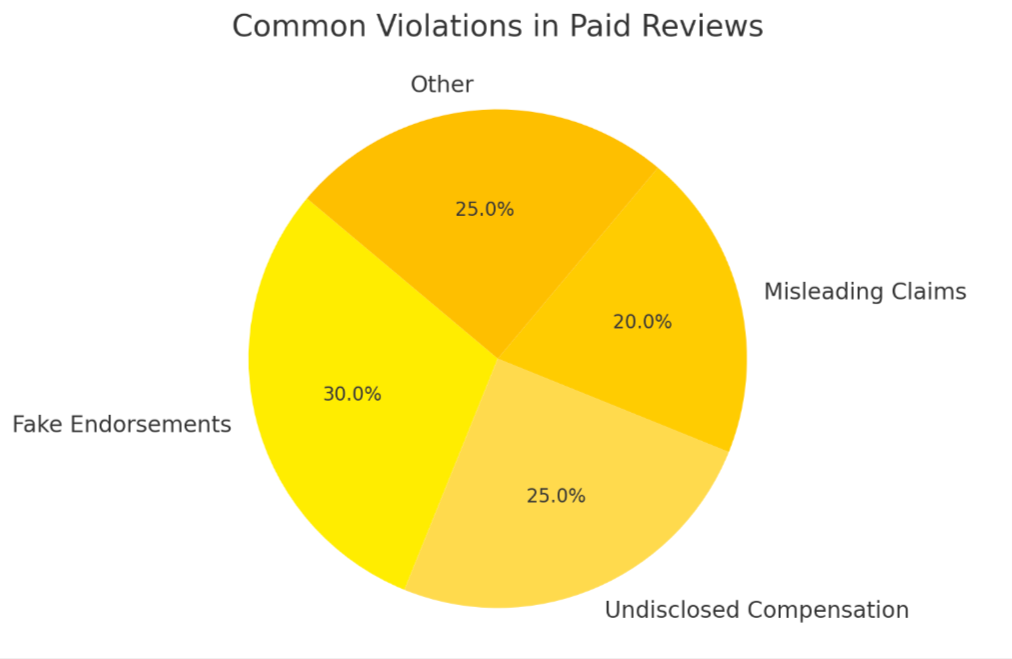Navigating Legal Aspects of Paid Review Writing
Ever wondered if those glowing online reviews are really telling the truth? Many don’t know that paying for fake praise is against the law. This post will guide you through the maze of legal rules surrounding paid and false endorsements, helping you stay informed and honest.
Dive in to clear your doubts!
Key Takeaways
- Paying for or posting fake online reviews is illegal according to the FTC, and doing so can lead to lawsuits and fines.
- The Consumer Review Fairness Act allows customers to post honest reviews without fear of retaliation from businesses, protecting their freedom of speech.
- Online review platforms like Amazon and Yelp use sophisticated software to detect and remove fake reviews, promoting authentic feedback.
- Victims of paid or fake reviews can take action by contacting the review site, reporting to authorities like the FTC, or seeking legal advice from an e-commerce lawyer.
- Companies must adhere to ethical standards in their online practices by disclosing any form of compensation in reviews and avoiding deceitful tactics that could damage trust with consumers.
The Legal Lowdown on Fake or Paid Reviews
The FTC takes a strong stance against paid and fake reviews, with strict guidelines in place to protect consumers from deceptive online review practices. Review websites also have their own regulations in place to prevent the misuse of paid testimonials.
The FTC’s stance on paid and fake reviews
Paid and fake reviews mislead consumers and damage trustworthy businesses. That’s why the Federal Trade Commission (FTC) takes a firm stance against them. It views these deceptive practices as violations of federal law designed to keep advertising honest and informative.
Companies or individuals caught publishing or paying for fake endorsements can face legal action from the FTC.
Transparency is key: marketers must disclose relationships if they’re offering freebies in exchange for reviews. Reviewers must be honest about their experiences, not promise positive coverage without merit.
Consumers rely on authentic feedback to make informed choices, and it’s up to everyone involved—advertisers, endorsers, review platforms—to play by the rules set out by consumer protection laws like those enforced by the FTC.
Review websites’ stance on paid and fake reviews

Shifting focus from the FTC, let’s consider how review websites tackle paid and fake reviews. They often have strict policies that forbid these deceptive practices. Sites like Yelp, TripAdvisor, and Amazon go to great lengths to maintain the integrity of their review systems.
Vigilant monitoring teams use sophisticated software algorithms designed to spot and remove inauthentic content quickly.
Moreover, many online review platforms require users to agree not to post biased or compensated testimonials as part of their terms of service. This helps create a culture where ethical guidelines are clear, encouraging honest consumer assessments while penalizing those who attempt to manipulate public opinion with fraudulent reviews.
Review sites actively educate users about the importance of transparency in sharing their experiences without monetary influence or external pressure.
Legal options for victims of paid or fake reviews
Victims of paid or fake reviews have several courses of action to defend their rights. These steps can help restore trust and ensure that deceptive practices do not go unpunished.
- Contact the website: Reach out to the online review platform where the fake review appears. Most reputable sites have policies against fraudulent reviews and will investigate your claim.
- File a complaint with the FTC: The Federal Trade Commission enforces laws against deceptive advertising and may take action if they find evidence of wrongdoing.
- Seek legal counsel: Consult an e-commerce lawyer who understands consumer protection laws for online reviews to discuss potential civil lawsuits.
- Send a cease and desist letter: Have your attorney draft a letter demanding that the author or the entity behind the fake reviews stop their activities immediately.
- Use social media: Address the issue transparently on social media platforms to inform your customers about the situation, but avoid defaming any parties involved.
- Monitor your online presence: Keep track of what’s being said about your business online to quickly identify any future instances of fraud.
- Set up Google Alerts: Create alerts for mentions of your product or company so you can act swiftly when new reviews are posted.
- Educate your customers: Encourage authentic feedback by informing your clientele about how important genuine appraisals are to your business.
- Report to other authorities: Depending on where you operate, other regulatory bodies may exist that oversee fair trade practices, so consider filing additional reports as needed.
Understanding the Consumer Review Fairness Act
The Consumer Review Fairness Act protects consumers’ ability to share their honest opinions in online reviews. It prohibits companies from using contracts to prevent customers from writing negative reviews and outlines penalties for violating these regulations.
What it protects
The Consumer Review Fairness Act protects consumers from being penalized for posting honest reviews. It prohibits businesses from including non-disparagement or gag clauses in their terms and conditions, allowing customers to freely express their opinions without fear of retaliation.
This act safeguards consumers by promoting transparency and ensuring that their feedback can be shared openly without facing legal consequences.
The Consumer Review Fairness Act also shields individuals who write truthful negative reviews from litigation or financial harm. Businesses are unable to take legal action against customers solely based on the content of a review, offering a layer of protection to those who share genuine experiences online.
Prohibited conduct
Engaging in the following conduct regarding paid or fake reviews is prohibited:
- Writing or posting fake reviews to deceive consumers and manipulate their purchasing decisions.
- Offering payment, free products, or other incentives in exchange for positive reviews without disclosing the compensation received.
- Threatening or penalizing consumers who leave negative reviews for products or services.
- Creating false accounts to leave multiple positive reviews for a product or service.
- Using deceptive practices to hide negative feedback or skew ratings on review platforms.
How companies can protect themselves
Companies can protect themselves in the following ways:
- Implement clear and transparent review policies on their websites to encourage authentic feedback and discourage paid or fake reviews.
- Utilize advanced software tools to detect and filter out suspicious reviews, ensuring that only genuine customer feedback is displayed.
- Train staff to recognize the signs of fake or paid reviews and establish protocols for reporting and addressing any suspected instances.
- Regularly monitor review platforms, social media channels, and other online spaces for any misleading or deceptive content related to their products or services.
- Collaborate with legal experts specializing in e – commerce and online consumer protection laws to ensure full compliance with relevant regulations and guidelines.
Penalties for violation
Violating the Consumer Review Fairness Act can result in legal consequences for businesses. Penalties include civil penalties of up to $16,000 per violation. In addition, companies may also face lawsuits from consumers and regulatory actions from the FTC for deceptive practices related to paid or fake reviews.
Failure to comply with FTC guidelines on disclosing paid endorsements and sponsored content can lead to severe penalties. These may involve fines reaching thousands of dollars per violation.
Non-compliance with regulations aimed at preventing review fraud can damage a company’s reputation and erode consumer trust, leading to significant financial losses and loss of credibility within the industry.
Legality of Paying for Online Reviews
Understanding the legal implications of paying for online reviews is crucial for businesses and individuals involved in e-commerce. It’s important to avoid unethical practices and seek the guidance of an e-commerce lawyer when navigating the world of online reviews.
What to avoid
Avoid posting fake or paid reviews without disclosing the compensation or incentive received.
- Do not deceive consumers by creating fake customer accounts to leave positive reviews for your products or services.
- Do not offer payment, free products, or other incentives in exchange for positive reviews without proper disclosure.
- Avoid manipulating review platforms by artificially inflating positive reviews or diminishing negative ones.
- Do not misrepresent the experiences of customers by fabricating testimonials or feedback.
- Avoid engaging in deceptive practices that violate consumer protection laws and FTC guidelines on online reviews.
- Do not underestimate the potential legal consequences and damage to consumer trust caused by engaging in unethical review practices.
The need for an e-commerce lawyer
Online businesses face numerous legal challenges, especially when it comes to managing online reviews and paid endorsements. An e-commerce lawyer can provide essential guidance on how to navigate the complex web of regulations, ensuring that businesses comply with FTC guidelines and avoid penalties for deceptive online review practices.
From advising on transparency in paid product reviews to disclosing sponsored content in compliance with consumer protection laws, an e-commerce lawyer is crucial for safeguarding businesses from potential legal implications related to influencer marketing and affiliate advertising.
Overseeing the legality of paying for online reviews and understanding the Consumer Review Fairness Act are just some areas where an e-commerce lawyer’s expertise is indispensable.

Reviewing the Regulation of Fake Reviews
Understanding the FTC regulations on fake reviews and the consequences of using them is crucial for both businesses and consumers. Recognizing the types of fake reviews and learning how to spot them can help in regulating deceptive online review practices.
FTC regulations on fake reviews
The FTC closely monitors fake reviews to protect consumers from deceptive practices. Companies engaging in fake review schemes may face hefty fines and legal consequences outlined by the FTC guidelines.
Spotting fake reviews can help consumers make informed decisions, while businesses adhering to ethical standards can build trust with their customer base.
Types of fake reviews
Types of fake reviews include:
- Fictitious Reviews: Completely fabricated reviews that are not based on genuine experiences.
- Incentivized Reviews: Reviews where the reviewer received compensation or incentives for providing a positive review.
- Negative Competitor Reviews: Intentionally false and negative reviews posted by competitors to damage a business’s reputation.
- Review Swapping: Colluding with others to post positive reviews in exchange for reciprocal positive feedback, irrespective of actual experiences.
- Robo-Reviews: Generated by automated software rather than real customers, often produced in large volumes to manipulate ratings and rankings.
- Unverified User Reviews: Made by individuals who haven’t actually used the product or service, thereby offering misleading feedback.
Consequences of using fake reviews
Using fake reviews can lead to legal consequences and damage to a company’s reputation. Businesses caught posting or soliciting fake reviews may face heavy fines and legal action from the Federal Trade Commission (FTC).
Customers who feel deceived by fake reviews could take their business elsewhere, leading to lost revenue for the company. Additionally, negative publicity surrounding fake reviews can erode consumer trust, harming long-term brand reputation and customer loyalty.
Detecting and removing fake reviews is crucial for maintaining transparency and credibility in online platforms.
How to spot fake reviews
Spotting fake reviews is crucial to making informed purchasing decisions and maintaining trust in online review platforms. Here’s how you can identify them:
- Look for abnormal review patterns, such as an influx of positive or negative reviews within a short time frame.
- Scrutinize the language and tone used in the reviews for similarities, suggesting they may be fabricated by the same source.
- Evaluate the details provided in the reviews to see if they align with actual product features or experiences.
- Check for excessive use of marketing buzzwords or overly dramatic language that seems insincere.
- Cross – check reviews across multiple platforms to see if there are discrepancies or inconsistencies.

Solutions for regulating fake reviews
To counter the prevalence of fake reviews, it’s essential to implement effective solutions for regulating online testimonials. Here are some strategies for addressing the issue:
- Employ automated algorithms and artificial intelligence tools to detect and remove fake reviews promptly. These technologies can analyze patterns and language cues indicative of fraudulent reviews.
- Implement strict verification processes for reviewers, such as email confirmations or purchase validation, to ensure the authenticity of user-generated content.
- Enforce clear guidelines and policies on review platforms regarding prohibited conduct and provide education on ethical review practices to users and businesses.
- Foster a culture of transparency by encouraging honest feedback and disclosing sponsored or incentivized reviews in compliance with FTC guidelines.
- Collaborate with regulatory authorities, industry associations, and legal professionals to establish comprehensive standards for monitoring and enforcing review authenticity. This may involve sharing data on suspicious activities and coordinating efforts to combat review fraud effectively.
- Empower consumers with tools to report suspected fake reviews easily, creating a transparent mechanism for flagging questionable content and enabling swift investigation and resolution.
- Encourage businesses to prioritize customer satisfaction over short – term gains from deceptive practices by promoting ethical marketing strategies that build trust with consumers.
Conclusion
In conclusion, understanding the legal framework of paid reviews is essential for both businesses and consumers. Clear guidelines from the FTC and other review platforms help protect against deceptive practices.
Knowing what to avoid and seeking legal advice when necessary is key to maintaining trust in online reviews. By being aware of regulations and ethical considerations, businesses can uphold consumer confidence while avoiding potential legal repercussions.

